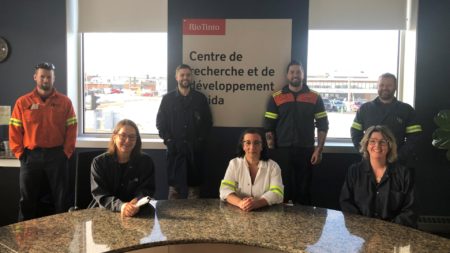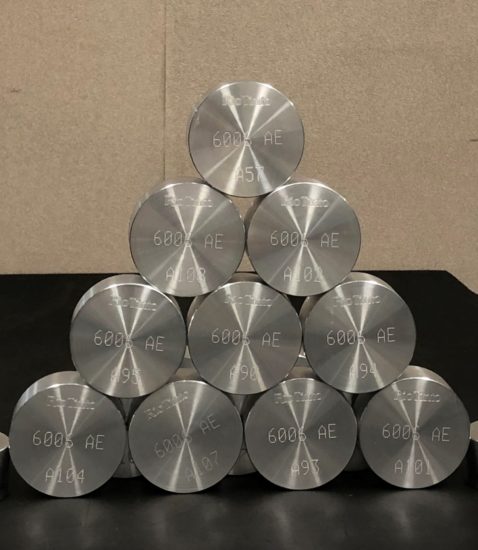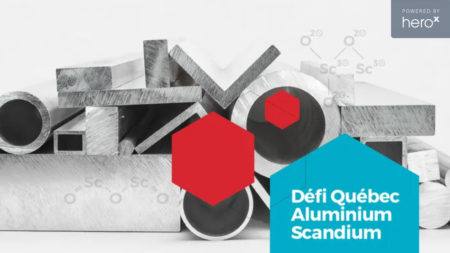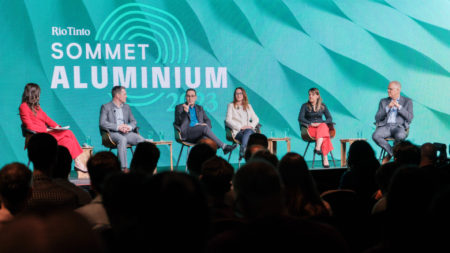The Analytical Chemistry Team Shines Behind the Scenes

Pictured: The ARDC’s Analytical Chemistry team: Lily Lapointe, Hafida Hamouche, Genevieve Gaudreault, Frederic Potvin, François Lagacé, Luc Fleury and Dany Tremblay.
The leading-edge aluminium produced at Rio Tinto’s smelters stands out globally because of its environmentally responsible qualities and its competitive production cost in the aluminium market.
To safeguard the quality of the metal produced, an entire team works to provide Rio Tinto’s business units with the knowledge, analytical means, and procedures necessary to produce and continuously develop the various products. The Analytical Chemistry team at the Arvida Research and Development Centre (ARDC) works behind the scenes to make it possible for high value-added products to shine internationally.
“The team’s role is to provide the plants with the analytical means to control processes and make sure that production is responsible, with a low environmental impact and low costs. The main activities of the Analytical Technologies group are to support research and development, provide technical assistance to the plants, and oversee the quality assurance network,” said Hafida Hamouche, Senior Research Scientist.
“To do so, the group produces high-quality certified reference materials (CRMs), which are unique to the ARDC in that they are produced with a chemical composition that is very close to that of alloys cast in Rio Tinto smelters. This reduces errors and means that quality metal can be produced quickly and efficiently.”
Plants need these reference materials, also known as standards, to control production.
ARDC-certified CRMs are produced in the form of billets that are three to four metres long with a diameter of 70 millimetres. These are then reduced and cut into discs that are 25 millimetres thick and 57 millimetres in diameter. Each standardised disc is identified by the name of the alloy and by its position along the billet and stamped with the Rio Tinto logo.
François Lagacé, Research Scientist, used an aluminium hockey puck as an example to illustrate the reference material. He said, “This is a disc that we can use to confirm the chemical composition of the alloy and to meet the specifications of the different alloy series. This type of sample would be used, for example, for the aluminium in soft drink cans or for the aluminium used to make cars. This sampling provides an accurate and precise description of the product composition, and this is what guarantees the quality and reliability of the metal produced in our plants.”

State-of-the-art equipment and international certification
Working in a technological equipment park, research scientists are busy developing and analysing different processes that will enable Rio Tinto to take a leadership role in responsible aluminium production. A variety of state-of-the-art technological tools are used to achieve the best results in terms of product reliability and stability. Computer tools are also integrated to process data and support the Industry 4.0 shift towards a technological future.
In addition, the ARDC has been ISO/IEC 17025 accredited since 1989 and maintains its accreditation by going through an internal audit every year as well as an audit by the Standards Council of Canada every two years.
This international standard accredits the laboratory by attesting to its competence in its field of expertise. It is a seal of quality certifying that standardisation requirements were met, thereby guaranteeing the analyses conducted.
For the year 2021, the team conducted thousands of analyses to produce seven reference materials, which are the result of the thorough work done by this dedicated, motivated, and qualified group of people.
The next time you enjoy a cold, fizzy soft drink, spare a thought for the Analytical Chemistry team members, who work behind the scenes and are so essential to the quality of aluminium products!


